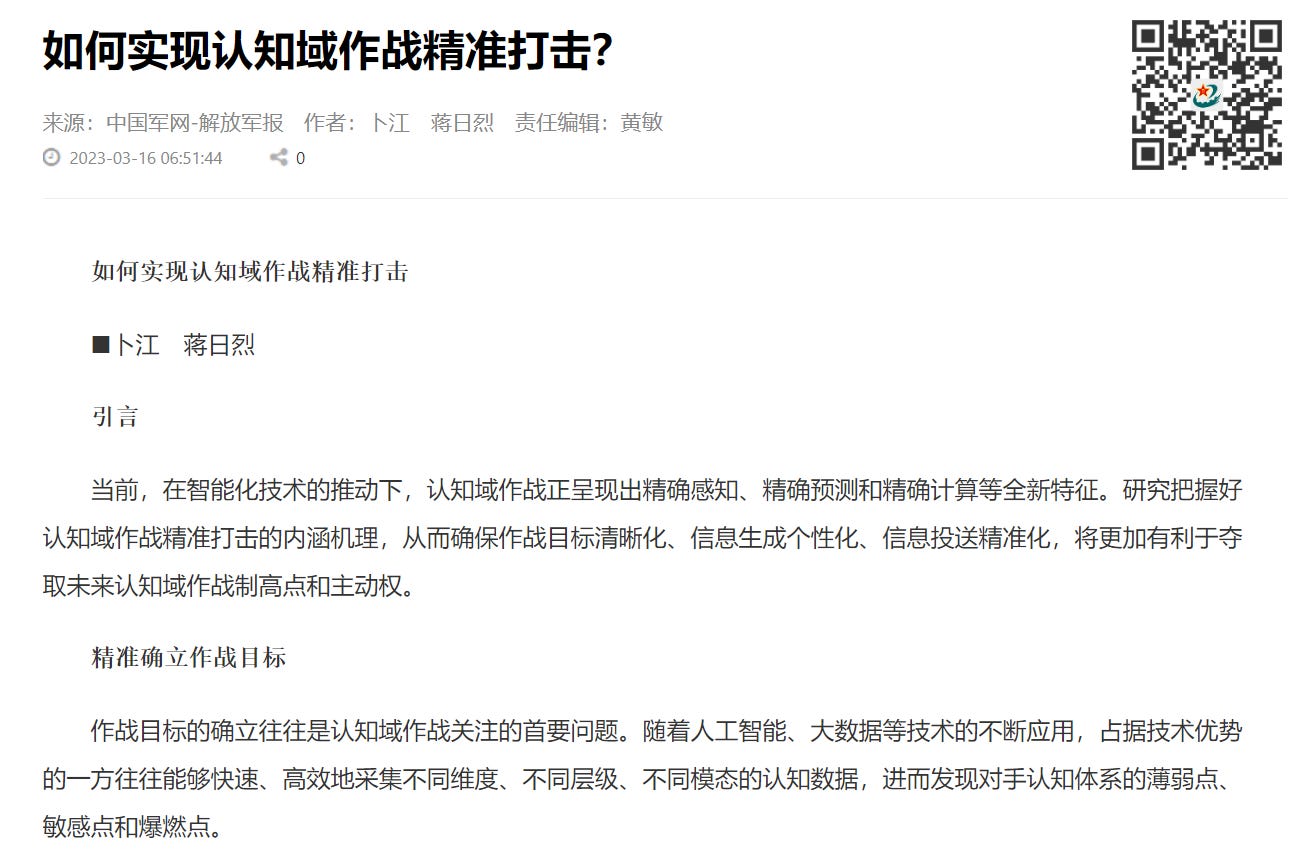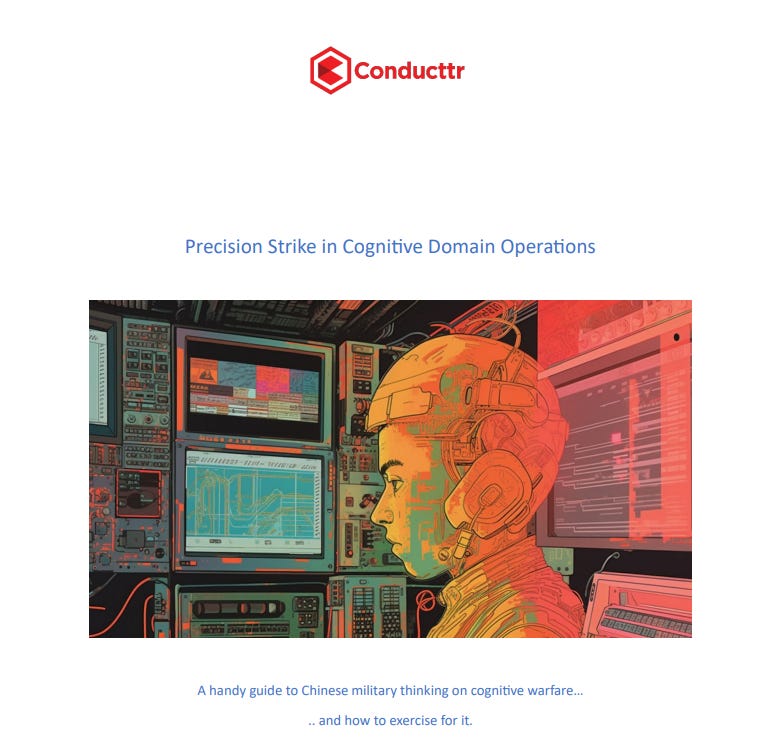QUICKLOOK: Precision Strikes in the Cognitive Domain: An Innovative Approach to Information Warfare
PDF debrief: CCP Cognitive Warfare - Leveraging Technology and Data for Effective Influence and Perception Management
What is meant by “Precision Strikes in the Cognitive Domain”:
The concept of "precision strikes in the cognitive domain" seems to refer to an approach within information warfare or psychological operations where specific messaging or influence tactics are used to target an adversary's decision-making processes or perceptions. The idea is to affect the adversary's cognition - their understanding, beliefs, and decision-making - with a high degree of precision and effectiveness.
Documents in review:
The above document presents a comprehensive analysis of cognitive warfare, drawing upon Chinese military strategies as a primary reference. The study delves into the critical stages of cognitive warfare, its precise combat objectives, and the role of Artificial Intelligence (AI) in its execution.
This document presents a series of tables that are intended as a kind of “how to” guide to cognitive warfare based on the paper presented in the China Military Network.
Background:
In the contemporary era, cognitive domain operations driven by intelligent technology are rapidly evolving, exhibiting new characteristics such as precise perception, accurate prediction, and meticulous calculation. These operations involve influencing and manipulating the cognitive systems of adversaries to gain a strategic advantage. To achieve success in this complex landscape, it is crucial to define clear combat objectives, generate personalized information, and ensure accurate information delivery. These elements play a fundamental role in gaining the upper hand in future cognitive domain operations.
Introduction:
These articles delve into the mechanisms of precision strikes in cognitive domain operations, emphasizing the importance of defining clear combat objectives, generating personalized information, and ensuring accurate information delivery. In the current landscape shaped by advanced intelligent technologies, understanding these elements is of paramount importance to seize the commanding heights and maintain the initiative in future cognitive domain operations.
Summary:
In the realm of cognitive domain operations, accurately establishing combat objectives serves as a foundational step. This involves leveraging advancements in artificial intelligence and big data technologies to swiftly and efficiently collect cognitive data from various dimensions, levels, and modalities. By harnessing this wealth of information, vulnerabilities, sensitive points, and potential triggers within the adversary's cognitive system can be identified.
For example, the internet's widespread use has resulted in an exponential growth of cognitive data. This abundance of data enables the creation of precise target profiles through the utilization of big data and psychometrics. These profiles allow for the analysis of political beliefs, values, national sentiments, and public opinions of the target objects, providing an avenue to influence their decision-making processes.
Labeling plays a pivotal role in cognitive warfare by abstractly classifying and generalizing specific groups or objects. A robust labeling system is crucial for effectively classifying and visualizing cognitive data, enabling comprehensive analysis and utilization. This system filters out irrelevant data and extracts valuable information, serving as a reference framework for cognitive combat scenario planning.
To enhance the impact of cognitive operations, it is imperative to design information "ammunition" that aligns with the thinking habits and perceptual styles of the target objects. Intelligent science and technology allow for the personalized customization of cognitive information themes, content, and forms. By tailoring information to the specific needs of target objects, their decisions and actions can be instantaneously and forcibly altered.
In terms of information delivery, understanding the principles of information dissemination is vital. Factors such as delivery targets, channels, and timing contribute to the effectiveness of cognitive strikes. By tracking cognitive dynamics and pinpointing the opportune moments for information delivery, strategists can maximize the impact of their operations.
For instance, consider the case of social media platforms. The vast amount of cognitive data generated by the internet can be utilized to target individuals or groups. By analyzing political beliefs, values, and public opinions, cognitive information can be customized and delivered through social media channels, effectively influencing decision-making processes.
Assessment:
"An Examination of Cognitive Warfare: A Study Based on Chinese Military Thinking and the Application of Artificial Intelligence," presents a comprehensive analysis of cognitive warfare, drawing upon Chinese military strategies as a primary reference. The study delves into the critical stages of cognitive warfare, its precise combat objectives, and the pivotal role of Artificial Intelligence (AI) in its execution. The exploration of precision strikes in cognitive domain operations in this article highlights the importance of establishing clear combat objectives, generating personalized information, and ensuring accurate information delivery. Examining these elements emphasizes their crucial role in gaining the upper hand in future cognitive domain operations.
The discussion on labeling as a vital process in cognitive domain warfare is insightful. It highlights the significance of a mature and reliable labeling system for classifying and visualizing cognitive data. By filtering out irrelevant data and extracting valuable information, the article rightly emphasizes the role of a label system as a reference framework for cognitive combat scenario planning. The focus on designing information "ammunition" that aligns with the thinking habits and perceptual styles of the target objects is well-founded. The utilization of intelligent science and technology to personalize cognitive information themes, content, and forms demonstrates the potential for instantaneous and forceful alteration of target objects' decisions and actions. The examples provided, such as the use of big data and psychometrics to create precise target profiles, further enhance the credibility of this argument.
In terms of information delivery, the article highlights the importance of understanding the principles of information dissemination. By tracking cognitive dynamics and identifying optimal timing for information delivery, it emphasizes the potential impact of cognitive operations. The examples provided, such as leveraging social media channels for targeted information delivery, effectively support this argument.
Conclusion:
The rapidly evolving landscape of cognitive domain operations driven by intelligent technology emphasizes the importance of defining clear combat objectives, generating personalized information, and ensuring accurate information delivery. Leveraging advancements in artificial intelligence and big data technologies, precise perception and analysis of cognitive data enable the identification of vulnerabilities and sensitive points within an adversary's cognitive system. The abundance of cognitive data, facilitated by the internet, allows for the creation of precise target profiles, enabling the analysis of political beliefs, values, national sentiments, and public opinions to influence decision-making processes. A robust labeling system plays a pivotal role in classifying and visualizing cognitive data, while the customization of cognitive information themes and content aligns with target objects' thinking habits. Effective information delivery, considering delivery targets, channels, and timing, maximizes the impact of cognitive strikes.




